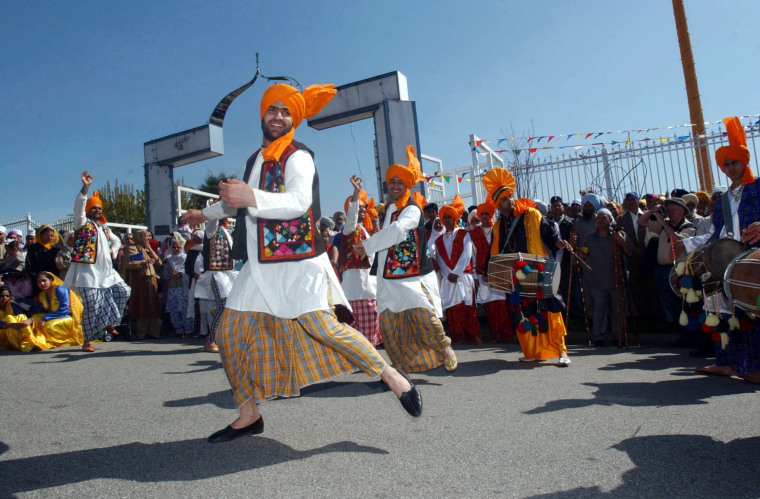This week, millions of Sikhs wearing vibrantly colored turbans parading to the sound of beating drums will commemorate a tradition centuries old.
The Sikh celebration called Vaisakhi happens annually in mid-April. The origins of Vaisakhi stem from a spring harvest festival native to the Punjab region of South Asia, but more importantly marked as a religious significance for Sikhs.
But while some may confuse Vaisakhi as the initiation of Sikhism, that is not the case.
“Vaisakhi celebrates the culmination of a centuries-long journey, from the foundation of the faith in 1469, to ensure equality of all people — regardless of race, gender, faith, nationality, or any other identity," Sumeet Kaur Bal, communications director for Sikh American Legal Defense and Education Fund, told NBC News. “This journey culminated in the institutionalization of the Sikh identity and our shared values, which occurred on Vaisakhi.”
In 1699, Guru Gobind Singh Ji (1666-1708) — the tenth Sikh guru-prophet — gathered a record number of Sikhs to formally establish the Khalsa Panth, a community of initiated Sikhs. The Khalsa Panth was formalized and entrusted as the collective body with authority. It is important to note that Sikhism was born at a time of great inequality and injustice in India — which in many ways continues today, according to Bal.
“Guru Gobind Singh Ji vested power in the Khalsa Panth, or Sikh familyhood, to be politically and civically engaged and combat injustice in the world around us, but to have this engagement guided and fueled by our understanding of religion,” Bal said.
Sikhism is a monotheistic faith founded on the principles of equality, freedom of religion, and community service. As the fifth-largest religion in the world, one of the core teachings of the Sikh tradition is that all Sikhs must cultivate spirituality while also serving the world around us. Sikhs, both men and women, cover their uncut hair with a turban which represents a commitment to equality and justice.

“One of the many terms that captures this outlook is sant-sipahi, which translates to saint-soldier,” Simran Jeet Singh, senior religion fellow for the Sikh Coaltion, told NBC News. “Maintaining such a balance is a difficult thing to do, yet being both spiritually focused and politically engaged is an integral part of the Sikh faith.”
Sikhs have been in the U.S. for over a 100 years, with large communities in California and New York. For decades, New York City has hosted the annual Sikh Day Parade, which will take place this year on April 23. Thousands of Sikh community members from around the country are expected to come together to share their traditions with local New Yorkers.

“The most popular aspect of the Parade is the langar, free food served in the way of the Sikh tradition, in Madison Square Park,” says Singh. “Tens of thousands of people enjoy the langar together, and it serves as a powerful way to socialize and connect with others who join.”
Sikhs mainly worship by singing from the scripture and reflect on their Gurus' teachings as a way to model values and principles within their own lives. Vaisakhi is fundamentally about celebration, remembrance, community, and progress. This week Sikhs will gather with their communities at gurdwaras, local places of worship, and reflect on these values.
Follow NBC Asian America on Facebook, Twitter, Instagram, and Tumblr.
